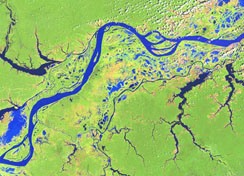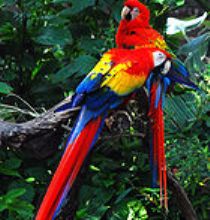| |
|
 |
Future of the Amazon a Catholic issue says leading lay activist
January 23, 2009:
 |
 |
 |
The giant leaf frog is threatened by the deforestation of the Amazon. Photo: http://en.wikipedia.org/
|
NOTE: A version of this article was printed by the leading Catholic weekly The Tablet in March 2009.
Leading lay activist Mary Colwell is preparing for the World Social Forum in Brazil - she writes about her concern for the Amazon, suggesting that the Catholic Church should be championing its protection.
"This Tuesday, January 27th 2009 the World Social Forum opens in Belem in Brazil. It promises to be a jamboree of events, talks, stalls, calls to action and heated discussion about the future of the Amazon basin by groups involved in social and environmental justice in this region; NGOs, pressure groups, charities, scientists, human rights activists and environmentalists will all be present.
Tomorrow, on January 24th, also in Belem, there is a meeting of Jesuits and associates to discuss their role in this vitally important part of the world.
I will be attending both.
 |
 |
 |
A Landsat Image of the Amazon River, November 30, 2000. Credit: NASA, Landsat.org, Center for Global Change and Earth Observations, Michigan State University
|
The Amazon basin is undoubtedly one of the most important eco-systems on earth. It regulates the atmosphere, absorbs carbon dioxide, provides one third of all the fresh water entering the oceans, and has by far the greatest biodiversity of any region on the planet. And, crucially, all of it sits cradled in the hands of Catholic countries.
The fact that the Amazon is a Catholic issue is largely missed on many people, including many in the Church, but Catholicism is embedded in the communities that live and govern there and therefore I believe this gives the Catholic Church a particular duty of care.
Of course there are many Catholics doing extraordinary work, particularly on the issue of land rights, community protection from logging and supporting those who seek to protect the rights of the indigenous peoples who populate many areas of the forest. Some have lost their lives doing it; Sister Dorothy Stang immediately comes to mind, and there are many others. Here I have no doubt the call of the gospel is being proclaimed. But I still have an uneasy feeling about the role of the Church in securing the protection of the rainforest - because there are still many questions that need to be addressed in order to promote action.
Protection of the rainforest from the destructive power of loggers, ranchers, mining companies and monoculture will require assertive action on behalf of areas where no people live, and vast areas of the Amazon are uninhabited (by people). And this is where the problem lies, because I believe the Catholic Church – Christianity – has no clear idea of our relationship to nature outside of its connection to people.
Of course, if people are living in an area, the Christian duty to fight for the rights of the poor and dispossessed are clear, and the forest is protected by default. But what about those areas devoid of people? What does Catholicism think about trees and animals when they are not contributing directly to human welfare?
 |
 |
 |
The scarlet macaw is an indigenous species to the American tropics. Photo: http://en.wikipedia.org/ |
If by cutting down a section of rainforest no one loses their home or is killed or made ill, does it matter? Particularly if cutting down the trees provides short-term employment. To put it baldly, does nature have a value in and of itself outside its contribution to human wellbeing?
To many people, when I have asked that question, the answer is a resounding yes, and it may seem strange that I have posed this question at all. But my experience of talking to all levels of the Catholic Church over the past four years has shown that the “yes” vote lies mainly in the lay community. In my experience the hierarchy of the Church is less likely to be convinced that the Church should act on behalf of that which is not human. And if the hierarchy won’t act then I deeply fear not just for the future of the Amazon but for tundra, ice fields, grasslands, mountains and oceans as well.
The reason I have this impression about the Church is because over the past few years I have been asking a particular question based on a personal experience.
About 15 years ago I went to the high Arctic to film a rare species of duck called a Spectacled Eider. This rather bizarre bird lives out its whole life above the Arctic Circle and even over-winters sitting in the middle of the frozen Baring Sea. It is a quite extraordinary and awe-inspiring little bird.
I stayed on a remote island and filmed a female brood with her clutch of eggs and then the ducklings waddle off into the Arctic Ocean to begin their mysterious lives out of the way of human influence. Very few people see Spectacled Eiders and so this was a great privilege.
A few years later I telephoned the man who owned the island to ask how the ducks were doing and his news was deeply shocking. The year after I left he went back again to check on the four females that regularly nest on his island. All four had been shot sitting on the nest. No one had taken the bodies for food, they hadn’t used the feathers or the eggs; they had been shot simply for being ducks in America. I put the phone down and wept, not just for the wickedness of the people who had carried out this callous act of violence but for the senseless loss of magnificent creatures.
My question to lay Catholics, religious and the Church hierarchy alike is this:
If Christ had been walking over that island and found those dead ducks, would he have wept? Not just for the people who had killed animals, but for the loss of the ducks themselves?
Overwhelmingly the answer to that question from the lay community is “yes”, but the hierarchy is split, with many saying “no – Christ wouldn’t weep over that which is not human.”
This story illustrates my point that there is confusion about our relationship to nature and therefore an unwillingness to put time and resources into the non-human world. It follows that it is unlikely that most of the Amazon Basin will really be the focus of concerted effort by the Church, because it will require it to take up the cause of nature itself. I sincerely hope I am wrong.
This is the year the Church has to act decisively. In November the Copenhagen COP will bring together 189 major governments to make the next set of decisions about climate change, which will include deals over deforestation and carbon trading.
Deforestation accounts for 20% of all greenhouse gases released into the atmosphere, more than all forms of transport combined. Simply by stopping cutting down the rainforest we will slash carbon emissions by a fifth. But other forces are at work. Huge industry needs the raw resources provided by rainforest areas - palm oil, beef, mining, ranching, soya and hardwood - and big money has a loud and powerful voice.
Will the Church be there at the table championing the environment or industry? Does it feel secure enough in its own theology of creation to make a case for rainforest protection? The Amazon needs the Catholic Church, but will it be there and respond to the cry for help?
In this year leading up to Copenhagen we don’t need more words, what we need is action. If the Pope would say Mass in the middle of the smoking ruins of a cleared area of forest, then he would focus the attention of the world onto that area in an entirely new way. The power of the symbolic gesture that inspires hearts and minds will do more to protect the rainforest than any number of words. This is the year to fire imagination and propel the world into a new era of environmental concern, and the Pope has the power to help that become a reality."
Mary Colwell is Catholic consultant to the Alliance of Religions and Conservation (ARC) and UNDP. She is also a film-maker with more than 20 years experience working at the Natural History Unit of the BBC.
*** Links
*** Link
here to read a news story about Al Gore's Inconvenient Truth.
***Link
here to read other Christian eco-news articles.
Links to external websites:
*** Link
here for details of a BBC interview following Mary Colwell's meeting with the Jesuits in Belem.
*** Link
here
to read a report by "Defenders of Wildlife" about the Spectacled Eider bird and the devastating effect climate change is having on its eco-system.
*** Link to www.curlewmedia.com/ for Mary Colwell's media website
|
 |
 |
|
|
|
|
|
 |
January 5, 2009:
Catholic project helped by ARC wins award for podcast
Clifton Diocese took silver at the Christian Broadcasting Council Awards with ‘Journey - The Sound of Many Waters Podcast’ - a reflection on the diocese's year of acting and thinking ecologically, which was conceived and planned with ARC's help.
|
 |
Last updated: September 24, 2009 :
Latest news on the Long Term Commitments
A sample of some of the faith groups around the world that are creating Five, Seven, Eight and Nine Year Plans to protect the natural environment, through the UNDP-ARC framework. |
 |
Projects overview
A complete listing of all current ARC projects |
 |
 |
|
|

